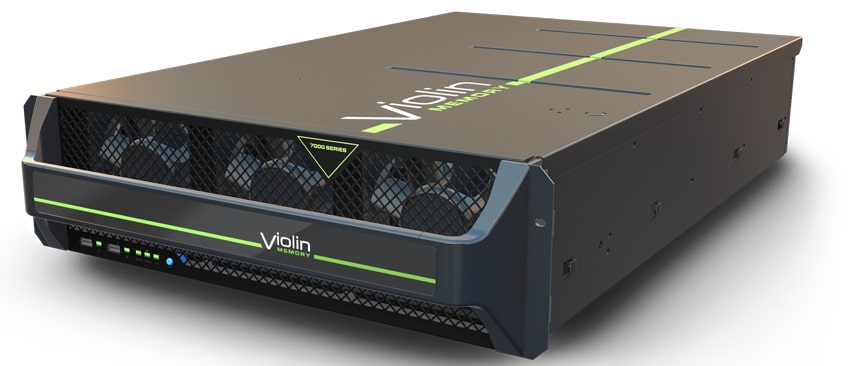Today Violin Memory announced that it new all-flash arrays (AFAs) in its Flash Storage Platform (FSP) family, the 7650 and 7450. Along with the new arrays, Violin announced a new platinum level of customer support for its entire FSP line, including the two new models announced today. And Violin is announcing a new cloud servicer, Concerto in the Cloud, a virtualized instance of the company’s OS that can be deployed in the cloud, public, private, or hybrid.

Violin has been in the all-flash game for a while now, making the first all-flash array ten years ago. While the company has been going through a bit of a rough spot with missed earnings, a dropping stock price, and a reduction of the work force, they still intend to release solid products and services. Like its last product announcement, Violin is release two models: a more performance-oriented model, the FSP 7650, and a “value” model, the FSP 7450. According to Violin the 7650 can provide a consist latency of 200us at 1 million IOPS, with the ability to hit 2 million IOPS at 1ms of latency, and has a density of 140TB of raw capacity in a 3U form factor. The more affordable 7450 is stated at delivering 340K IOPS at 1ms and is priced as low as $0.60/GB. Both arrays include data-at-rest encryption that meets the data encryption standards of FIPS-140-2 Level 2 and AES 256-bit XTS.
Violin currently has a Gold Support Service that includes things such as around the clock Violin experts to help resolve issues, a technician onsite within four hours to replace parts, and a proactive service that watches for any potential issues. Platinum support takes this a step further with assigned experts to resolve issues and proactive planning through bi-annual health checks with recommendations for optimal running conditions. This new level of service comes with five guarantees:
- Effective Capacity Guarantee: Assures Violin customers that take advantage of FSP data reduction technologies achieve the effective capacity ratio promised for their workloads.
- High Availability Guarantee: Assures Violin customers using the FSP 7700 with Stretch Cluster will achieve 99.9999% (six 9's) uptime, virtually eliminating storage access interruptions and unplanned downtime.
- Service Pricing Guarantee: Assures Violin customers their pricing will not increase when they choose to renew support agreements for FSP solutions.
- Flash Endurance Guarantee: Assures Violin customers will have flash memory available during the usable life of their FSP solution, with Violin providing flash modules if they wear out.
- Scalable Capacity Guarantee: Assures Violin customers they can purchase capacity as it is consumed, with capacity appearing instantly and non-disruptively, over the life of their FSP solution.
Violin also announced a possible future software-defined storage (SDS), Concerto in the Cloud. This new SDS product would allow virtualized instances of the Violin Concerto OS to be deployed in the private, public, or hybrid cloud. Not only would this increase data mobility it would allow a new tier of data storage for colder data to be moved to the cloud. Violin states that it will have a single-pane-of-glass for management that reaches from its FSP through the cloud.
Violin’s FSP will also support NVMe over fabric in the future. This support would lower latency even farther than FSP 7650 is currently capable of (Violin claims a minimum latency of 150us).




 Amazon
Amazon